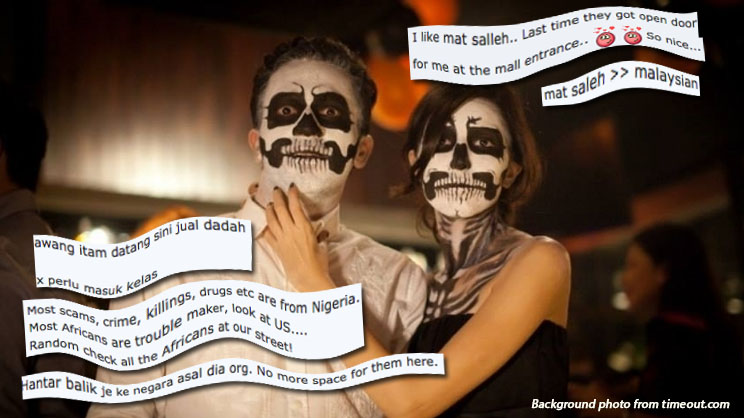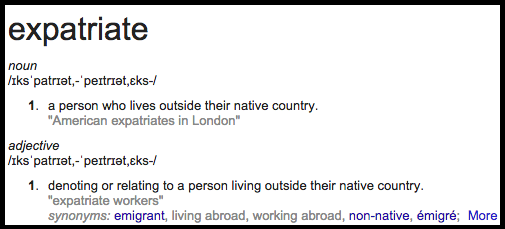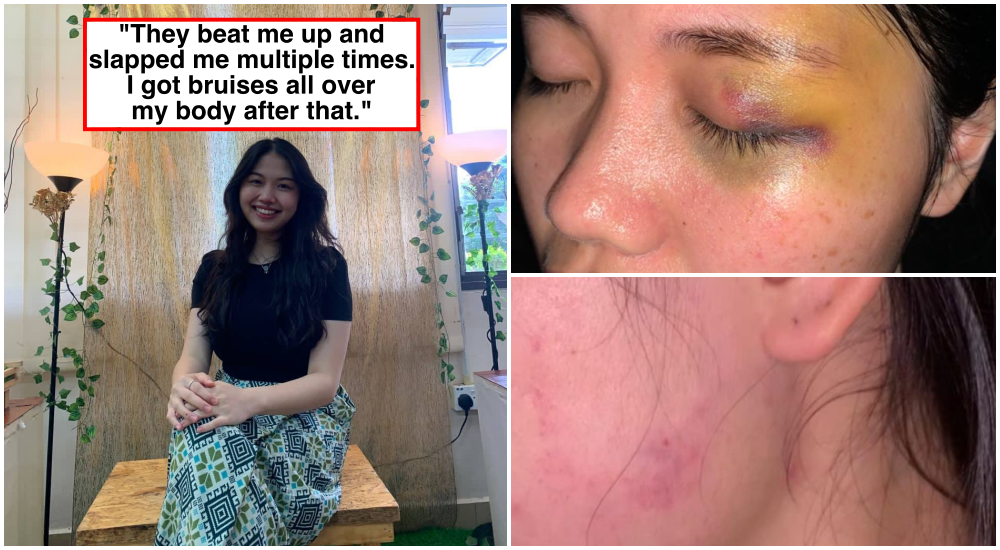M’sians not racist? 6 expats share their shocking experiences

- 2.1KShares
- Facebook2.0K
- Twitter14
- LinkedIn5
- Email14
- WhatsApp27
Recently, this heartwarming video by Facebook user Calvin Ng made the rounds on social networks, illustrating just how painfully isolating living among strangers in a strange land can be. Kudos to the Malaysians featured for seeing beyond ethnicity and being kind! And kudos to Calvin for the effort!
Posted by Calvin Ng on Monday, March 30, 2015
Although this video went viral after we were done writing this article, we felt that it had such a positive note that we had to mention it in the article. But despite the positive responses, let’s zoom out a lil and focus on other foreign workers in Malaysia. Y’know, the expats. (Yes, technically, they’re foreign workers too.) How do WE treat them?
Malaysians are a funny lot. We pride ourselves by being warm to visitors, but after talking to some expats, we find the experience for them isn’t always as friendly as we’d hope.
Why ah?
Well, for one thing, we’re guilty of a huge crime: judging someone based on the colour of their skin.

That sounds like you’re saying we’re RACIST. You sure or not??
TBH? It kinda seems like it. Unfortunately, we’ve seen and heard plenty of things that lead us to the same inevitable conclusion: As a foreigner in Malaysia, your experience will depend on how white or black you are.
We’ve seen white people get served before locals in restaurants; cashiers pointedly refusing to serve black people even when it was their turn; this condo in Subang banned “African” tenants in 2013; and we know plenty of otherwise reasonable friends who quicken their pace when they find themselves walking in close proximity to a black man.
Heck, we may even be guilty of doing it ourselves! And it doesn’t matter if the black person in question is a professional, is highly educated, earns a certain income, comes from the UK or the US or Africa or the Middle East: Because he is black, we somehow equate him to being dangerous.
We let you judge for yourselves lah hor. Close your eyes and tell us: What comes to mind when you hear the word “expat”? Google helpfully tells us:
Chances are, though, you thought of someone who works as a professional, who earns a certain amount, who probably comes from a Western country like the US or the UK – and let’s face it, is probably white. Somehow, we refer to those OTHER non-Malaysians living in Malaysia as “foreign workers” or “immigrants.” Now, foreign workers have their own problems to deal with — we’ll refer you to this handy cheat sheet from Poskod.my for a better idea of their struggles — and the racism they face from Malaysians is definitely chief among them.
But what about those who don’t quite fit into the “foreign worker” label? How about the expats, both white and non-white? Does racism cast the same ugly shadow over them that it does over these so-called immigrants?
With so many questions making our heads pening, we decided to speak to 5 expats (for our purposes, non-Malaysians living and working here legally in professional positions, covering the full spectrum of skin colour from white – brown – black) to see if they could help make us…well…less pening.
1. Shannon Scott; 30; Teacher
Thanks to her work with an education non-profit, Shannon spent much of the two years she lived in Malaysia in areas where foreigners, much less white people, were not really a common sight.

“People were always incredibly welcoming and very nice wherever I went. I did often get some funny looks, and looks of ‘What is happening?’ or ‘She must be lost.’ But one of my favourite things was driving around a kampung in my Baju Kurung and having people at the roadside just laugh a bit or have shocked look on their face.
I had several experiences when it was clear that I was receiving different treatment, and I am sure countless more that I didn’t even recognise. I went to Port Dickson for a vacation, and there was a long line at the hotel to check in.
My friend, who was also American, and I were give refreshments and given access to shorter line, while the local guests were not given refreshments and had to wait in line.
The couple behind me noticed and made a comment in BM that it wasn’t fair; they were right. When I was traveling in Labuan, they held a ferry for me because I was an ‘orang puteh melayu.’
I think the incident at the hotel, and several other examples like it, happened because the perception of my ethnicity is that I might have money or power or be special in some way. At work, any attempt I made at learning BM was considered amazing. All I had to say was ‘Nama saya Shannon’ and I was afforded oodles of extra points*, but really it was my responsibility to learn the language and it was actually quite arrogant of me to sit in a meeting with school administration and expect to speak in English. I should have done much more to learn BM and Mandarin and become more culturally aware, but I was let off the hook a lot because I was American.”
*Ed’s note: Kinda like when Kimora spoke in BM:
“I worked with expats of different races and ethnicities, and a couple of my American co-workers who looked ‘more Malaysian’ than me were not afforded the same generosity and privileges. There are definitely stereotypes and prejudices that people hold against people of African descent, and that impacted the experience of some of my co-workers.
I do think that if I had been of darker race or ethnicity I would have been treated differently. Being white and being American are things that are generally valued in Malaysia and carry positive ‘feelings’, mostly based off of the media’s portrayal of white Americans. I think there is mis-information or over representation of negative images in the media of other races and ethnicity – whether that is American or Malaysian media.
Despite the role of ethnicity and privilege, I think in some interactions, people went out of their way to be accommodating and welcoming to ensure I thought well of Malaysia.”
2. Grace Wilson; 24; Nurse,Counsellor, NGO Volunteer, Public Speaker & Businesswoman
Grace has spent four years living and working in Malaysia. Even though she is also white, the stories she tells are vastly different from those that Shannon shared with us – largely due to the fact that Grace is married to a Nigerian man.
“Having a great husband who is an African by ethnicity, we do experience odd reactions every time we get out of the house. It ranges from stares, to open-mouthed faces, to hateful & despising looks. I have experienced so many uncomfortable situations that I usually don’t look into faces anymore. And all that happened in KL by the way – not in a kampung.
I feel that many look at me as a prostitute. They can’t just believe that a beautiful young woman would go out with a handsome African man.
People ask my husband about his ‘friend’ or ‘girlfriend.’ Their jaws drop wide open when he tells them ‘She is my wife, we are actually married.’
Usually locals look up to Westerners. But I feel when I’m with my husband, I’m a piece of trash to them because they communicate that to me in a non-verbal way.
Police once tailed us without reason for 3km and eventually took us out. They would always ask my husband to come to the back while I stay still inside the car so that they could ask him for money. I would always get out, making them feel uncomfortable until they would leave disappointed for not getting any money.
I think Malaysians often think very highly of themselves. This is expressed in how they treat foreign workers from other Asian countries – their working condition and length of time on duty. I do not see any signs that they are welcome here. Without those foreign workers our children would be without with a babysitter and we wouldn’t have an improved MRT coming up soon.
I meet a lot of people during official events or through my occupations. The number one question is almost always a ‘Where are you from?’ In most cases, I feel the question is asked out of curiosity and not interest in my very person. We are living among the locals because we believe that will aid our integration, eat their food and try to adjust to their culture but through this question we are not seen as a half-Malaysian, even after I have been here for four years, and my husband for eight years! Questions asked afterwards are often immediately very private and when I ask these questions back they are always met with reluctance; the person changes the topic entirely or ends the conversation.
I have observed that some Malaysians are not secretive. Whatever you share with them about yourself will soon become a household topic. That is why foreigners who had fallen victims of this usually advise, ‘Never share anything private & confidential with any local.’ Once a lady bluntly asked me in the lift, ‘How much are you paying for your house rent?’ This question is not out of interest but of sheer nosiness.

For the reasons above, we don’t keep local friends. They remain always acquaintances to us and we are very careful what and how much we tell them about our lives or happenings generally.”
3. Farah L.; 38; Registered clinical pharmacist (UK) and creative director of her own e-commerce company (Malaysia)
Farah is a British woman of Pakistani descent. She and her husband fell in love with Malaysia while on their honeymoon and have been living and working here for more than seven years.

“I cannot think of any examples of where I have been treated differently because I am an expat. I think I am in fact treated more like a local because I look like a local Indian. Once I was scolded by a market stall lady as I clearly couldn’t converse with her in BM!
I think that I have noticed that white people are sometimes treated with more respect. Perhaps that’s due to the way in which they act, the posts they hold and due to a deeper confidence. Waiters are often more chatty when I’m with my husband.
I think people are more prejudiced about black people. I often wonder if I would have been treated differently if I was of African origin as I’ve heard taxi drivers say that they are reluctant to take black passengers. I also think I would be treated differently if I wore the head scarf because people often assume I am not Muslim. I don’t wear a hijab and my husband is white. When local Muslims know we are Muslims they treat us very warmly. This is good for us but may imply that non-Muslims are not as warmly accepted.
I was born in England but look obviously different, so it’s opposite to the situation here where I am a foreigner but look local. On the whole, I’ve never had any problems living in the UK – but then I have also had eggs thrown at me and the word ‘Paki’ (a racist term in the UK) used against me too. I worked for the public health system and found that I was being paid less than a white blonde 3 years junior to me – I think this was a racist issue. Islamophobia is on the rise in the UK and Europe and I wonder whether if I wore a hijab I would be treated differently.”
4. Dossier White; 30; Leadership Development Consultant
Dossier lived in Malaysia for two years, working in the education sector. As a lighter-skinned black woman, she rarely faced discrimination and in fact, was often mistaken for a Malay.

“People [in Malaysia] reacted very positively to me. But I’ve been told that I have an approachable spirit, so I think naturally people feel comfortable around me. But then again, I’ve been told that I look Malay. I can’t count the number of times strangers have spoken to me in rapid BM, who then express shock when I say, ‘Sorry, I’m American’.
The work that I did put me in close relationships with the government schools and employees so I was often faced with lots of scepticism and caution. People (rightfully so) are very protective of the community culture and history, and didn’t want any outsider telling them how to improve. I completely get it, so I often had to go overboard with humility and carefully craft my messages to ensure they would be received well.
The times I was treated differently were when I played the helpless foreigner card. If I made a traffic violations, I was pulled over because I was foreign – because clearly 100 other people just made the same violation. But I also got out of it because I was foreign and would play the helpless clueless sweet girl role with police and they would let me go. So it didn’t work but also worked in my favour at the same time.

White America isn’t very popular in Islamic Nations. When I was [living in KL], there was a mini riot at the US embassy. [Note: This was around the time many Islamic nations, including Afghanistan, Indonesia, Libya, Sudan and Egypt, were protesting the release of a film alleged to be anti-Islam] In Malaysia it wasn’t as bad as other Islamic Nations, but there was still a small protest.
When I asked my Malaysian friends if they thought I would be okay they told me, ‘Don’t worry just say… (I can’t remember the BM phrase).’ I said what does that mean? They said it means ‘I’m not white.’ So no matter where I travel whether it be Malaysia or Indonesia, or India, there seems to be this unspoken sense of ‘Brown Solidarity.’
But in comparison to Africans, I think they don’t have it so easy. Especially men. American media has a strong international presence and most peoples’ initial interactions with foreigners will be through radio, television, or magazines.
And whether we like it or not, these images subconsciously are embedded in our psyche and influence how we think and feel about others. So I still saw a general sense of fear when it came to black men in Malaysia, but it’s everywhere.
I’m 5’2, small frame, fair skinned, with long dark hair. Physically, I’m not intimidating. I’ve never had to be self-conscious about going to other places or “fitting in” I will never fully understand what it feels like to be afraid to assimilate. My brother who is dark skinned, and almost 6 ft tall has never visited me in other countries and although he’s never explicitly said it, I believe he’s a bit afraid of how he’ll be treated.”
5. Shilen Tanna; 35; Teacher/Lecturer
Shilen is a British Indian in his seventh month of a two-year contract in Malaysia.

“Because of my appearance, generally, I’m not even noticed in a crowd, although some are taken aback at my height, as I am perhaps much taller than most Southeast Asians. Some think I am local and therefore aware of all the cultural/social aspects within Malaysia. Like most foreigners, it has taken time to acclimatise to the small idiosyncrasies and the various expectations made of you based on your appearance.
I think this simply comes down to the colour of your skin and initial perception based on previous stereotyping of how individuals look. Many of my colleagues are white and when in social situations I get the impression there is a perception of wealth linked to this.
Being ‘non white’ may sometimes be seen as ‘s/he will also have wealth – otherwise how can they be in that group?’ This may result in being overcharged for certain items as it does seem to feed into the idea there is a local price and an expat price. If you were black and with African heritage…I have witnessed moments were individuals again have been treated very differently.
From the particular part of the UK city I come from it is the flip side of this situation where I would stand out very easily due to very little ethnic diversity in that particular area.”
6. Eddy Wilson; 36; Researcher & Biomedical Scientist, Public Speaker, Businessman
Eddy moved to Malaysia from his native Nigeria more than eight years ago, to study and then work. He’s married to Grace (interviewed above).

“When I am out and about in KL, some people would look at me with hostility and hatred.
I feel that I am often mistreated based on where I am from and the way that I look.
Locals would leave me deserted in public transport and on lifts. They usually covered their noses. There have been a few times when I have gotten harassed by Malaysian police just because I have black skin.
There are times when I am called foul names like ‘Negro.’
In 2008, I got conned by an Indian-Malaysian goldsmith of gemstones worth of RM100,000. In 2009, I got conned by a Sabahan Datuk who ran away with over RM 21,000 I gave to him for some foreigners’ work permits. In 2011, I lost my Gen2 car to a cheat Iranian-Malaysian car dealer and Malay former owner and worse still, the consumer tribunal twisted justice to their favour. In 2012, I got conned out of RM12,000 by a Malay woman who promised to register me a company for my private business here. In 2014, I got threatened with a knife by a cheat Malay taxi driver in his late 50s.
I feel that my ethnicity mattered in all the cheats. Foreigners are often naive and easily trust people especially those that are from cultures where people are very sincere, open & trustworthy to one another. That made us easily trust the locals here. We feel that not knowing and understanding the mentality here & the rules and laws of everyday life that guide the locals mattered as well.
I feel that all of this happened due to the barbarism of some locals, their level of exposure, the myths told about other countries, poor mentality, my country of origin, and my defamed skin colour.

It is very different in other countries that I have lived in, where I felt more accepted, loved respected & secure. My experience in Germany & Switzerland was a memorable one. The people were friendly, probably because of level of exposure. No discrimination, rejection or disrespect was experienced.
Based on my experiences here, would I ever come back? Never. Not even in my dreams.”
————-
So what’s the conclusion we can draw from all of this? Well, here’s the main one:

… because it DOES matter if you’re black or white. Ok, here’s how it looks. White = wealth or privilege. Black = crime and violence.
We’re not sure exactly how this belief became ingrained in our collective psyche, but it probably doesn’t help to already be primed with the Asian mentality that fair is beautiful (ergo, the darker your skin, the less “beautiful” you are). From the people we spoke to, it seems pretty clear that we treat our white visitors a whole lot better than we treat our black ones. And, even worse, it seems that we’re not the only ones who judge based on experience — it’s also pretty clear that even in countries like the UK or US, this kind of racism exists.
We know some people reading this may say, “Well, they brought it upon themselves. Stereotypes exist for a reason. Enough of them must have done something that we must suspect them all, for our own safety.” Heck, a news editor at Utusan Malaysia basically said the same thing last year.
But is that really fair? Must the actions of a few spoil things for everyone? Isn’t that the same as saying that all Malays are lazy, all Chinese only care about money, and all Indians are gangsters? Do we assume all black people are criminals because they started out that way, or did they become criminals because of the assumptions we make about them in the first place? Which came first, the chicken or the egg? Are you as pening as we are yet?
While you digest all of this, we’ll leave you with this advice from our interviewee Eddy, which we think is pretty spot-on:
- Treat everyone with respect no matter the country of origin/status because everybody deserves it.
- Do not forget that anybody can be a foreigner tomorrow – if not you, then your children or a relative.
- Be accommodating & hospitable, because it is a principle in every religion.
- There is criminality in every nationality; therefore it is barbaric to label a country bad.
- Religion should not be grounds for accepting or rejecting anyone, by the simple fact that we are all humans.
- Reconcile with the fact that no matter where you come from, your complexion might be different — but all blood is always red.
- 2.1KShares
- Facebook2.0K
- Twitter14
- LinkedIn5
- Email14
- WhatsApp27




